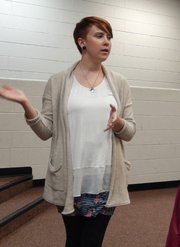Substance Abuse, Personal Story
“Kids see their friends using these drugs and still doing OK, so they don’t realize how dangerous they are.”
— SRO Coordinator Bill Fulton
It’s one thing for people to warn others about the dangers of substance abuse. But it’s more powerful when they share personal stories of how drugs and alcohol affected their own families.
And that’s what happened during the recent forum at Madison High. Called “Protecting Against the Realities of Substance Abuse,” it was put on by Parents Reaching Out To Educate Communities Together (PROTECT), a task force of the Unified Prevention Coalition of Fairfax County (UPC).
First to speak was School Resource Officer (SRO) Coordinator Bill Fulton. He’s been with the county Police Department for 25 years and, as a narcotics supervisor for several years, he saw the effects of drug use firsthand. And then it hit home.
“I have three children, including a son, 19, and he was involved with alcohol and other substances,” said Fulton. “So it can be challenging as a parent, no matter who you are.
“THERE ARE A LOT of synthetic drugs now, too, and easy access to them on Websites. So, parents, be alert if your children change friends or lack interest in things they used to like. Check their bedrooms, pants pockets and their phones.”
Basically, he said, “As parents, no matter what we did, our son seemed to fall through the cracks. But I was inquisitive. I asked him, ‘Where are you going? Who’ll you be with?’ And I told him to call me from [his destination’s] house phone.”
Fulton said teens know they’ll get suspended if they bring drugs into school, so they instead do drugs outside of school. THC is the chemical that induces highs from marijuana and, said Fulton, “THC levels are up to 30-percent stronger now. So marijuana’s much more potent and is laced with other things — and teens don’t know what they are.”
He said alcohol’s the gateway drug leading to marijuana and other narcotics. For example, molly gives “an LSD-type, hallucinogenic high, and kids have no idea what the outcome will be,” said Fulton. “Spice is synthetic marijuana, and they can get heroin from [Washington], D.C.”
“Kids see their friends using these drugs and still doing OK, so they don’t realize how dangerous they are,” said Fulton. “But they can talk with their SRO at school or leave a tip on the anonymous tip line about huge parties when parents are out of town. And, kids, it would be nice to see all your friends at graduation. You’re not ratting them out; you’re looking out for them.”
Next speaker was Westfield High grad Tayler Gibson who, in 2007 and 2008, was part of a Centreville heroin ring. Initially, though, she said, “I thought using alcohol and drugs was stupid and thought I was better than that. But in my junior year of high school, I worked as a restaurant hostess, and I thought the college kids who worked there, too, were cool. They used drugs and alcohol recreationally and still carried on their lives.”
Later, when the police caught her and her boyfriend with marijuana in his car, she told her parents she didn’t know it was there. “They believed me, so I had no consequences,” said Gibson. “Then I hooked up with an old boyfriend who did heavier drugs, like ecstasy, crystal meth and cocaine. Eventually, my boyfriend and his friends started using heroin, which scared me.”
ONCE SHE TRIED IT, though, she was quickly hooked. “We did it often; we’d put in money together and go to D.C. to get large amounts,” she said. A month after Gibson started taking heroin, she and her boyfriend were driving back from the District and were stopped by police and arrested. She was charged with possession with intent to distribute heroin.
“But the charges were dropped,” she said. “I told my parents the drugs in my system were Percoset so, again, I had no consequences. Then the police started arresting my boyfriend and his friends. I still needed heroin, so another friend and I kept buying it for another six months or so.”
But when Gibson crashed her mom’s car returning from a D.C. drug buy, she told them she was a heroin addict. “I went to detox and then to an inpatient treatment facility,” she said. “But I snuck home, got my stash and continued to use there. They found out and made me leave.”
Then, when she and several others in the ring were charged federally with conspiracy to distribute heroin, she remained free while they were jailed. “I kept using drugs, just not heroin,” she said. “I was being drug-tested, so I stopped using the detectable drugs and took up alcohol.”
In court, Gibson could have been sentenced to five to 40 years in federal prison, but the judge was lenient with her. She received 30 days jail, 200 hours community service and five years probation.
“My boyfriend got 20 years in prison,” she said. “Our sentencing was because one of our friends overdosed and died. A month after my sentencing, I stopped drinking and have been clean for four-and-a-half years. But it took quite a bit of lessons and consequences.” So, she told parents, “It’s best to prevent this from happening to your children.”

